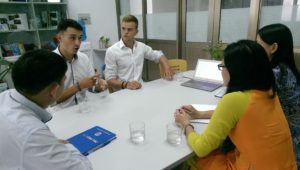The success of a country depends largely on a qualitative education system. During our stay in Ho Chi Minh city, we got a chance to visit the young and thriving Ton Duc Thang University. Established in 1997, it currently hosts 25.000 students, mostly Vietnamese, but aims to open its lecture rooms to a more diverse public. This institution provides for the knowledge hungry rising middle class of Vietnam. Students, starting their tertiary education mostly around the age of 18, can choose from 13 faculties, and courses ranging from “Water supply and sewage” to a MBA track.
After our breakfast of phò (a noodle soup) and a ca-phê (coffee) we entered the gates and met our contact person Mr. Phan Dao, Director of European Co-operation Center. Having spent a substantial part of his life in Czechia he speaks the language fluently. A pleasant surprise from a native Vietnamese.
In our following meeting with Ms. Mai Linh and Ms. Vien Minh we described membrane technologies that could be applicable for the Vietnamese market and discussed how the population could benefit from an affordable water treatment. As we learned, water is plentiful in Vietnam for the majority of the year, however, not always suitable for drinking due to pollution or salt intrusion, the latter particularly in the Mekong Delta. In the cities, people have water available at homes and the municipality ensures a certain quality of water supply.
However, from our experience, the end users are skeptical about water quality and rely on bottled water for cooking and drinking. Ho Chi Minh city has also got problems with the treatment of waste water and just like Bangkok, the streets are often plagued with a foul sewerage smell. Japanese company Mitsubishi has targeted Vietnam for implementation of its MBR technology – Rayon through a Vietnamese company Greentech, so the market is getting ready!
 After lunch a tour of the university took place guided by Uyên. We were quick to notice the vast number of students undertaking a military training. Apparently, a month’s training is mandatory for every student and takes place during the first month of their studies. Next to army uniforms, the lecturers, male and female students also subject to a dress code. Three times a week, girls are supposed to wear Ao Dai (a pink long dress) and the boys white shirt and a tie.
After lunch a tour of the university took place guided by Uyên. We were quick to notice the vast number of students undertaking a military training. Apparently, a month’s training is mandatory for every student and takes place during the first month of their studies. Next to army uniforms, the lecturers, male and female students also subject to a dress code. Three times a week, girls are supposed to wear Ao Dai (a pink long dress) and the boys white shirt and a tie.
On the university ground is situated a large multifunctional sports hall and a football stadium, where the staff and students exercise to stay in good shape. An equally large area is dedicated to the parking of motorcycles and scooters, the hallmarks of Ho Chi Minh city.
In the afternoon, the dean of the faculty, Mrs Nguyen Thuy Lan Chi came to meet us and discuss opportunities how TDTU and Flo-Bro can cooperate in the near future (after our return from tour d’Asia).
To commemorate our visit, we took a group photo under the picture of Tomas Bata sr. and Tomas Bata jr. hanging in the office. This Czechoslovak entrepreneur is a role model for many Czechs. He has built a major shoe industry in the country which has gradually evolved into a global business. Let his strategies be an inspiration to us too. He has brought shoes to the people, we shall bring membranes!
